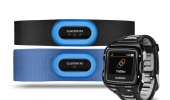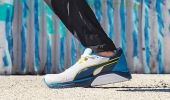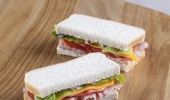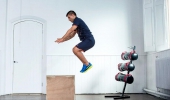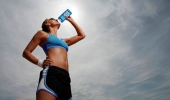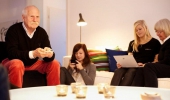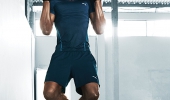Words: Sarah Pickering
With the recent launch of the IGNITE XT cross trainer locally and with PUMA’s ForeverFaster Fitness Campaign well underway, the global sports brand continues to challenge athletes in driving the question “What are you training for?”.
Bringing the campaign to life are a series of films featuring PUMA’s elite ambassadors. We have already seen the how fastest man in the world, Usain Bolt, and Arsenal Football Club stay fit #NoMatterWhat. Next in the series we have a sneak peak into the training regimens of star striker Sergio Agüero and the Cuban National Boxing team. Watch these film links featuring Agüero and the Cuban National Boxing team training in their new training shoes.
http://youtu.be/B74rsIzT8vo
http://youtu.be/GpEH73xCSDg
Q&A with Sergio Agüero:
Q: What are you training for? What’s your greatest ever goal?
The most exciting goal I have ever scored was probably the one against QPR in May 2012 in extra time that led us to win the Premier League title that year. These are the exact moments I train hard for every day, to be able to score, to be awake and make an impact in the game, even after 90 minutes on the pitch. Days like these are the pay-off for the hard work we all put in.
Q: How does training help your performance on the pitch?
In football, training is absolutely key to performance. Being able to run, switch directions and change speed whilst simultaneously controlling the ball and overseeing the whole pitch is extremely complex. You need to practice your tricks and shots again and again, to enable muscle memory and to help your body perform. In addition to this, you need to be physically strong and absolutely fit to be able to last 90 minutes, and sometimes even longer. Without constant and intense training, my performance on the pitch would be impossible.
Q: What’s a typical training session for you?
It depends on the day and the time in the year. During pre-season we train very differently to how we train towards the end of the season. In general, it is always a mixture of running and workouts in the gym for physical strength, and actual training with the ball on pitch. On the pitch, the training consists of shooting and passing exercises, game practice and tactical sessions.
Q: How often do you train in a year?
During the season, we train almost every day. After a match day we often only have a light training session, with mostly running and stretching to relax the body. This is complemented by massages and sometimes a day off. But this is followed by days with 2-3 training sessions per day. I would say I train on 90% of the days in a year.
Q: How do you train for speed? Any specific tips for training to become faster?
When training for speed in football, the ball plays a huge role. You can be as fast as you want, but if you cannot control the ball at the same time, you are lost. I recommend to run with the ball, and also to train to change directions, so you will be able to outdo opponents with really quick moves.
Q: What kind of obstacles have you faced and overcome to achieve your goals?
The journey from being a kid dreaming of the national team to being a professional footballer living in Manchester was a long and hard one, and there were always obstacles. When I first played professionally at my old club, Independiente, I was only 15 years old. Looking back at it today, it feels crazy how young I was. My appearances at such a young age, meant that expectations were very high, and the pressure was hard to deal with. After I had already played for the Argentina senior squad, I moved back to the youth team, which felt a little bit like a step back at the time. But I always believed in myself and also had people that supported me, so thinking about it now, I am happy about every obstacle that was in my way, because it made me stronger.
Q: What’s your advice for someone who’s struggling to find motivation to reach their goals?
My advice would be to never give up and always believe in yourself. If you don’t believe in yourself, why should anyone else? And don’t tell everyone about your dream, because people can be judgmental, which can have a negative impact on your motivation.
Q: Has training changed a lot for you in the past few years?
Yes, definitely. The training with the clubs constantly moves forward and coaches try out new things and training variations. The style of play of most professional football leagues has changed a lot. It has become much quicker, with a lot of pressing. Because of that, training routines have changed of course, too.
Q: Any particular food and drink that help you when you’re training?
I try to eat and drink healthily all year round, so I drink a lot of still water every single day, at least 3 litres. I love pasta, but I need to cut down on that as too many carbs conflict with my need for speed (laughs). Because of that I try to combine chicken or fish with vegetables and salad.
Q: What milestone in your career are you most proud of?
I think it is the move to Europe in 2006. This was an important step for my career and I will always be thankful for this opportunity, thankful, and at the same time I will always be proud of myself, for how I managed the move back then.
Q: What does #NOMATTERWHAT mean to you?
It really describes my attitude that brought me to the position I am in right now. No matter what day, what mood, what weather, what circumstances, I always played football, because it was the one thing that made me happy and gave me hope.
About PUMA
PUMA is one of the world’s leading Sports Brands, designing, developing, selling and marketing footwear, apparel and accessories. For over 65 years, PUMA has established a history of making fast product designs for the fastest athletes on the planet. PUMA offers performance and sport-inspired lifestyle products in categories such as Football, Running, Training and Fitness, Golf, and Motorsports. It engages in exciting collaborations with renowned design brands such as Alexander McQueen to bring innovative and fast designs to the sports world. The PUMA Group owns the brands PUMA, Cobra Golf, Dobotex and Brandon. The company distributes its products in more than 120 countries, employs more than 10,000 people worldwide, and is headquartered in Herzogenaurach/Germany. For more information, please visit http://www.puma.com
